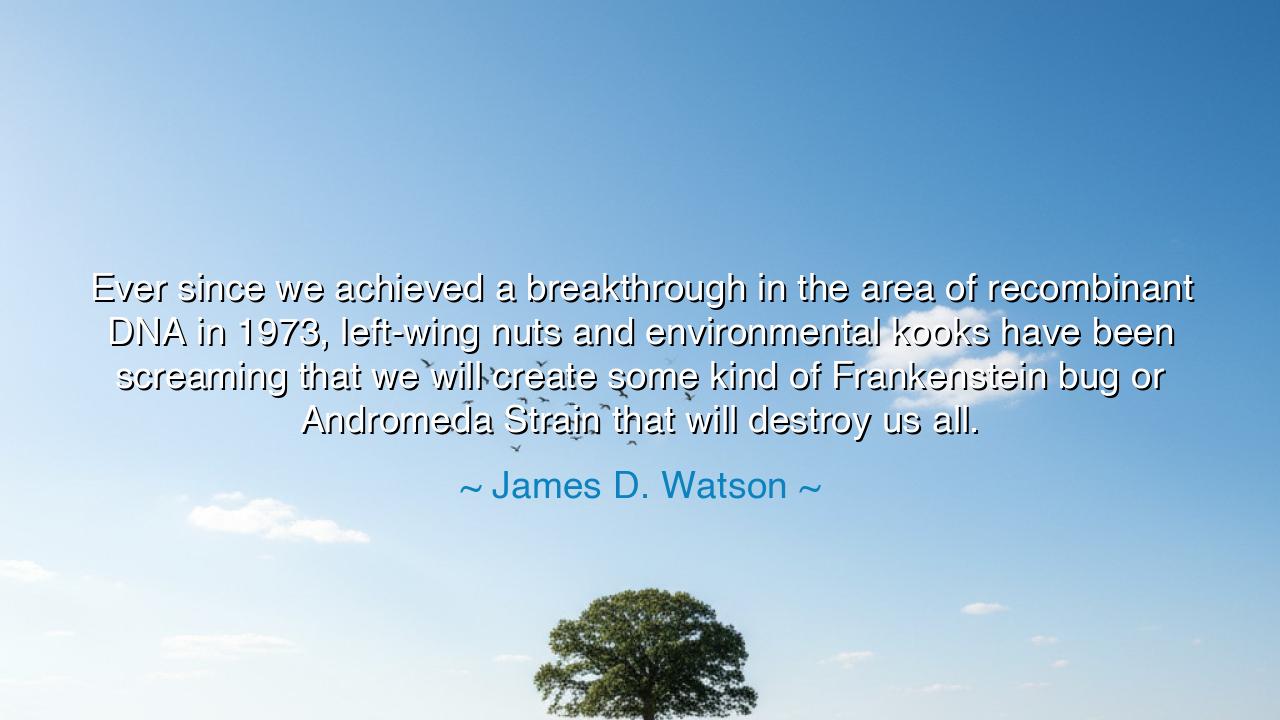
Ever since we achieved a breakthrough in the area of recombinant
Ever since we achieved a breakthrough in the area of recombinant DNA in 1973, left-wing nuts and environmental kooks have been screaming that we will create some kind of Frankenstein bug or Andromeda Strain that will destroy us all.






The words of James D. Watson, co-discoverer of the double helix, echo with both defiance and foresight: “Ever since we achieved a breakthrough in the area of recombinant DNA in 1973, left-wing nuts and environmental kooks have been screaming that we will create some kind of Frankenstein bug or Andromeda Strain that will destroy us all.” Behind this provocative declaration lies not arrogance, but a deep frustration with fear masquerading as wisdom. Watson, who stood at the frontier of biology, spoke from the vantage point of a pioneer surrounded by doubters—those who, when faced with the unknown, see monsters instead of miracles. His words are not merely about science; they are about the eternal tension between innovation and fear, between humanity’s potential to create and its instinct to destroy what it does not yet understand.
In 1973, the recombinant DNA revolution was born—a moment when humanity first learned to cut and recombine the code of life itself. It was as if humankind had stolen a spark from the divine forge, the very alphabet of creation. With this discovery came both awe and terror. Many rejoiced at the possibilities: the curing of disease, the improvement of crops, the extension of life. Yet others trembled, haunted by visions of Frankenstein’s monster—the creation that turns upon its maker—or the Andromeda Strain, the imagined plague that devours civilization. Watson saw that fear not as caution, but as paralysis. He lamented that in the name of safety, humanity might chain its own progress, mistaking curiosity for hubris and innovation for sin.
Throughout history, every great advance has faced the same chorus of fear. When Galileo dared to say the earth moved, he was condemned as a heretic. When Prometheus stole fire for mankind, the gods chained him to the rock. When Marie Curie pursued the invisible forces of radioactivity, she was warned that she was meddling with death. And yet, from their courage flowed enlightenment, warmth, and healing. The ancients knew that every gift from the heavens comes with peril—but it is only through courage that we learn to master it. Watson, in his fiery words, was not mocking caution but challenging cowardice—the refusal to learn, the clinging to ignorance when truth is within reach.
The fear of creation has always been a reflection of our fear of ourselves. We project our own darkness onto the tools we wield. The people who warned of a “Frankenstein bug” did not fear DNA—they feared human folly. But Watson believed that knowledge is the antidote to fear. It is not ignorance that protects us, but understanding. A sword in the hand of a child is dangerous, but in the hand of a disciplined warrior, it defends nations. So too with science: it is not the tool that corrupts, but the heart that wields it without wisdom. His challenge was to trust in the light of inquiry rather than cower in the shadows of superstition.
And yet, there is a warning hidden within his defiance. For while fear can cripple progress, recklessness can destroy it. The ancient Greeks told of Icarus, who, flying too near the sun on wings of wax, fell from the sky. The lesson was not to shun flight, but to balance ambition with humility. Watson’s quote, though fierce in tone, invites us to find that balance—to reject irrational fear while cultivating moral responsibility. The world does not need fewer dreamers; it needs dreamers who understand the weight of what they hold.
The story of recombinant DNA did not end in disaster—it became one of humanity’s greatest triumphs. From it came insulin synthesis, gene therapy, cancer treatments, and vaccines that save millions of lives each year. The “Frankenstein bug” never came. What came instead was proof that courage guided by reason can transform the impossible into the inevitable. The prophecy of doom faded, and in its place rose the dawn of the biological age, where knowledge itself became the seed of life renewed.
Thus, let the generations remember: the world is always divided between those who build and those who fear the builders. The wise learn to respect both—the builder’s fire and the cautious heart that keeps it from consuming all. The lesson of Watson’s words is not to mock fear, but to rise above it, to confront the unknown with both intellect and integrity. For progress, like all sacred things, demands courage tempered with conscience.
So let us not flee from the future in terror of “Frankenstein’s shadow.” Let us walk toward it with eyes open, hearts steady, and minds sharp. For it is not creation that threatens us—but the failure to understand it. To fear knowledge is to reject the destiny of our species. To embrace it wisely is to fulfill the promise written in our very DNA—the promise to evolve, to learn, and to create life, not destroy it.






AAdministratorAdministrator
Welcome, honored guests. Please leave a comment, we will respond soon